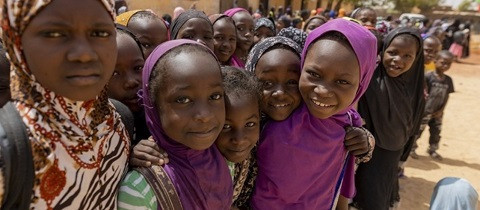
GCED Basic Search Form
Quick Search
أنت هنا
الأخبار

Today, over 875 million of the world’s students remain affected by the COVID-19-related school closures, with the majority in Sub-Saharan Africa. Globally, UNESCO estimates that 23.8 million learners from pre-primary to tertiary education may be at risk of not returning to school, including 11.2 million girls and young women.
For Aicha Bah Diallo, a former Minister for Education in Guinea and a founding member of the Forum for African Women Educationalists (FAWE), Africa is facing an unprecedented education crisis as it struggles to mitigate the impact of school closures. Also a jury member for the UNESCO Prize for Girls’ and Women’s Education, Bah Diallo took the time to talk to UNESCO about what she and her colleagues are observing across the region and the key priorities for girls’ and women’s education in Africa as we look to the future.
What is the immediate impact of COVID-19-related school closures in Africa?
The COVID-19 pandemic has signaled the start of a crisis impacting health, education, the economy and as well as food security in the region.
All public and private schools and other learning institutions have been closed since March in most African countries and there is a realization that the region has neglected to adequately invest in both health and education. If schools continue to remain closed for a long time, children will not only miss crucial opportunities for learning but will more likely fall into forced labor or have poor nutritional outcomes as they are missing out on a daily meal usually provided at school.
For girls, the consequences are more devastating, particularly for the most vulnerable and marginalized. We know that girls will face risks of early and forced marriage or early pregnancy, preventing them from continuing or returning to education.
Experience shows that girls are disproportionately impacted by crisis. What learning alternatives are being implemented across the region to ensure the continuity of learning for girls and women?
FAWE’s national chapters report that out of school students in the region are being encouraged to follow educational broadcasts via television, radio or online, with some schools using social media platforms like Telegraph to share materials.
While these initiatives are positive, alternatives to ensure continuity of learning are not reaching most girls, women and other vulnerable and disadvantaged groups due to limited access to technology. While 80% of African households have access to radio, only 34% have access to the internet. UNESCO’s International Institute for Educational Planning reports that 89% of learners in sub-Saharan Africa do not have access to a computer at home.
This gap in learning is creating high levels of anxiety among girls about their future. Adding to that, the social isolation that comes with no longer attending school is impacting girls’ socio-emotional learning and overall wellbeing.
We must work closely with parents to identify those who have not been able to help their daughters keep up with their schoolwork over this time. Remedial courses need to be implemented to ensure that these students do not end up permanently dropping out of school.
Looking forward, how can we ‘build back equal’ for girls’ and women’s education in Africa and more generally after this global crisis?
COVID-19 has brought to light the inequalities within African education systems and societies, generally. While countries are managing the virus, they need to look ahead and develop strategies that simultaneously dismantle the structural and systemic barriers reinforcing these inequalities.
For example, countries must create and support an enabling environment for the expansion of digital infrastructure so that all students, be they rural or urban, male or female, have access to online, interactive learning platforms. These platforms must also be used to provide training to teachers on virtual curricula to ensure that all students have access to quality education.
Concretely, our Ministries of Education must negotiate with mobile operators and telecommunications companies to obtain fair and reasonably priced internet packages that ensure the delivery of distance education to all.
It is also crucial that the lessons learned in different countries during this crisis are documented, and that the collection and disaggregation of data is prioritized.
This crisis presents an opportunity to redesign African education into a vibrant, equitable and resilient system that can withstand future crises. Women and girls must be at the core of both the initial response and the long-term planning.
More information
- UNESCO Prize for Girls’ and Women’s Education
- New campaign: Keeping girls in the picture
- UNESCO’s COVID-19 Education response
- Building back equal: Girls back to school guide
URL:
